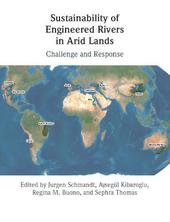
|
Sustainability of Engineered Rivers In Arid Lands: Challenge and Response
Hardback
Main Details
Description
This interdisciplinary volume examines how nine arid or semi-arid river basins with thriving irrigated agriculture are doing now and how they may change between now and mid-century. The rivers studied are the Colorado, Euphrates-Tigris, Jucar, Limari, Murray-Darling, Nile, Rio Grande, Sao Francisco, and Yellow. Engineered dams and distribution networks brought large benefits to farmers and cities, but now the water systems face multiple challenges, above all climate change, reservoir siltation, and decreased water flows. Unchecked, they will see reduced food production and endanger the economic livelihood of basin populations. The authors suggest how to respond to these challenges without loss of food production, drinking water, or environmental health. The analysis of the political, hydrological, and environmental conditions within each basin gives policymakers, engineers, and researchers interested in the water/sustainability nexus a better understanding of engineered rivers in arid lands.
Author Biography
Jurgen Schmandt is Professor Emeritus of Public Affairs at the University of Texas and Distinguished Fellowat the Houston Advanced Research Center where he developed their sustainability program. He specializes in water policy and sustainable development. He previously worked at the German Academic Exchange Service, Organisation for Economic Co-operation and Development (OECD) and Harvard University. He used his work on water and drought in the Rio Grande basin and Northeast Brazil to start the SERIDAS project in 2013. He has published books and articles on technology and society, environmental regulation, climate change, water policy and sustainable development. Aysegul Kibaroglu is Professor of International Relations at MEF University, Istanbul. She was a visiting professor at the University of Texas, Austin. She is the author of Building a Regime for the Waters of the Euphrates-Tigris River Basin (Brill, 2002) and co-editor of Turkey's Water Policy (Springer, 2011). She has published in International Negotiation, Water International, Water Policy, International Journal of Water Resources Development and Global Governance. She is a founding member of the Euphrates Tigris Initiative for Cooperation (ETIC). Regina M. Buono is a nonresident scholar at the Center for Energy Studies at Rice University's Baker Institute for Public Policy and a doctoral candidate in public policy at the Lyndon B. Johnson School of Public Affairs at the University of Texas, Austin. She is a co-editor of Regulating Water Security in Unconventional Gas and Oil (Springer, 2019) and has published in Water International, Water Policy, Environmental Science and Policy, and Environmental Science and Technology. Sephra Thomas is a recent graduate from the University of Texas, Austin. She completed her Master of Public Affairs and Master of Science in Environmental and Water Resources Engineering. Through her graduate career, she has edited and published a report on the sustainability of the Rio Grande/Rio Bravo, developed a MOOC for the NAIAD2020 project at IHE Delft, and researched the intersectionality of water management in Mexico City, Chicago, and the Nile Basin. She hopes to continue her career in water resources management in the intersection between policy and engineering.
Reviews'... an important contribution to the very timely topic of the challenges associated with using and protecting [river] resources. In particular, this unique group of contributors jointly show that the effects, both potential and observed, of climate change will necessitate changes in resource management. By considering prevailing conditions and the approaches currently taken with respect to such widely spread and differently managed systems, they offer readers many needed lessons ... Recommended.' I. D. Sasowsky, Choice Connect
|